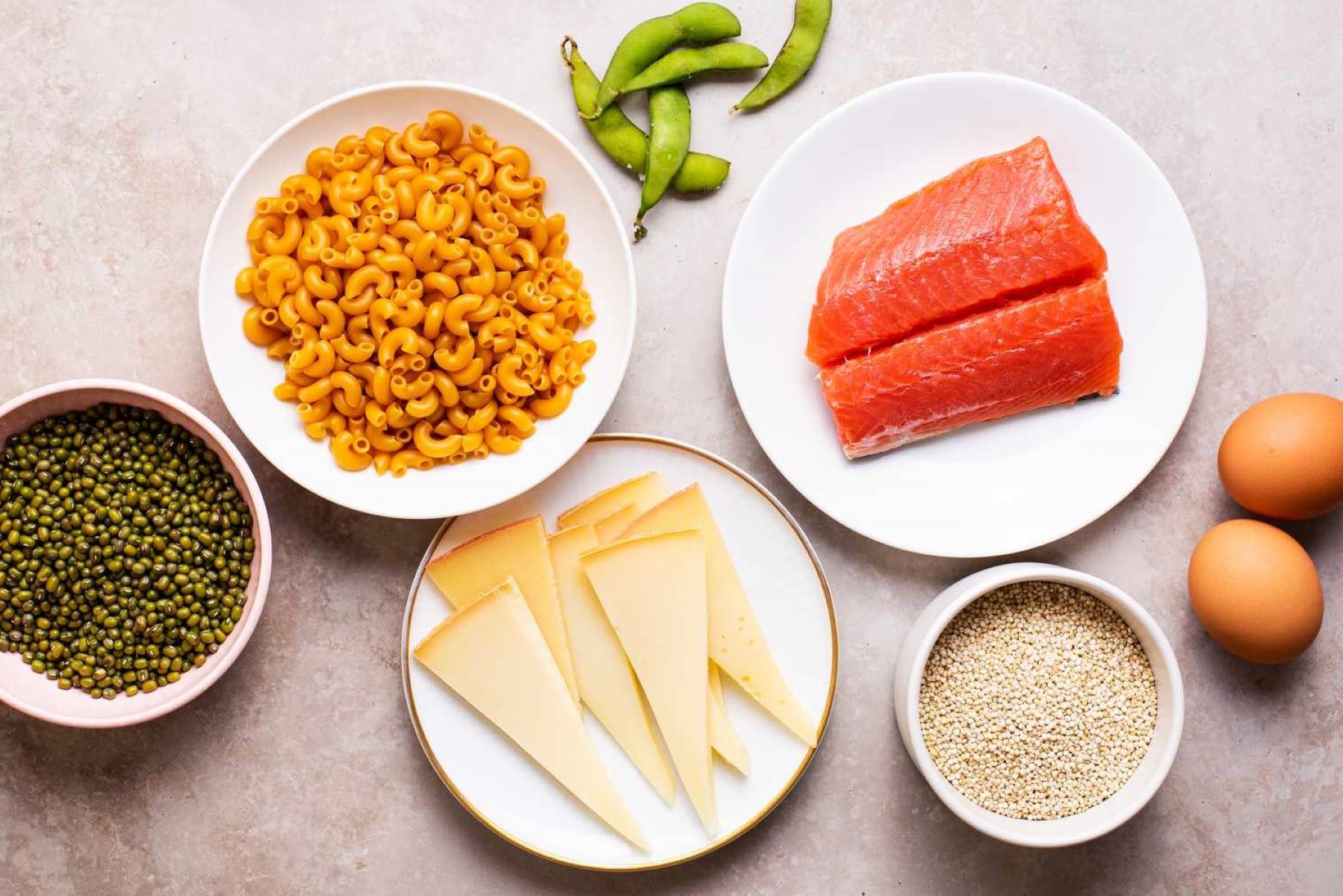Home>Health & Nutrition>Can Running Help Me Lose Weight On A 2000kcal A Day Diet?


Health & Nutrition
Can Running Help Me Lose Weight On A 2000kcal A Day Diet?
Published: March 7, 2024
Discover how running can support weight loss on a 2000kcal daily diet. Learn about the impact of exercise on health and nutrition.
(Many of the links in this article redirect to a specific reviewed product. Your purchase of these products through affiliate links helps to generate commission for Therunningadvisor.com, at no extra cost. Learn more)
Table of Contents
The Benefits of Running for Weight Loss
Running is an excellent form of exercise for weight loss due to its ability to burn a high number of calories in a relatively short amount of time. Here are some of the key benefits of running for weight loss:
-
Calorie Burning: Running is a high-impact cardiovascular exercise that can torch a significant number of calories. The number of calories burned during a run depends on various factors such as speed, distance, and individual body weight. On average, a 30-minute run can burn anywhere from 200 to 600 calories, making it an efficient way to create a calorie deficit necessary for weight loss.
-
Boosts Metabolism: Regular running can help increase your metabolic rate, which means your body will continue to burn calories even after you've finished your run. This post-exercise calorie burn, known as excess post-exercise oxygen consumption (EPOC), can contribute to weight loss over time.
-
Muscle Toning: Running engages multiple muscle groups, including the core, legs, and glutes. Over time, this can lead to improved muscle tone and definition, which can contribute to a leaner appearance as you lose weight.
-
Appetite Regulation: Running can help regulate appetite and cravings, making it easier to adhere to a 2000kcal a day diet. Some studies suggest that aerobic exercise like running can help suppress appetite and reduce overall food intake.
-
Stress Reduction: Stress and emotional eating can be significant barriers to weight loss. Running can act as a stress-reliever, releasing endorphins that can improve mood and reduce stress levels, potentially curbing the urge to overeat.
-
Improved Cardiovascular Health: In addition to weight loss, running offers numerous cardiovascular benefits, including improved heart health, increased lung capacity, and reduced risk of chronic diseases such as heart disease and diabetes.
Incorporating running into your weight loss journey can offer a multitude of benefits beyond just shedding pounds. Whether you're aiming to lose a few pounds or embark on a significant weight loss transformation, running can be a valuable tool in your arsenal.
Read more: How Can My Diet Help Alleviate PMS Symptoms?
Understanding the 2000kcal a Day Diet
The 2000kcal a day diet, also known as the 2000 calorie diet, is a widely recommended daily calorie intake for many adults. This calorie level is often used as a general guideline for nutritional labeling and meal planning. Understanding the 2000kcal a day diet is essential for individuals looking to manage their weight effectively. It's important to note that the 2000kcal a day diet is not a one-size-fits-all approach, as individual calorie needs can vary based on factors such as age, gender, weight, height, and activity level. However, it serves as a reference point for many individuals to maintain their current weight or as a starting point for those looking to create a calorie deficit for weight loss. It's crucial to focus not only on the quantity of calories but also on the quality of the foods consumed within this calorie limit. Emphasizing nutrient-dense, whole foods such as fruits, vegetables, lean proteins, and whole grains is key to meeting nutritional needs while staying within the 2000kcal limit. Understanding the 2000kcal a day diet sets the stage for effectively integrating running as a complementary component of a weight loss journey.
How Running Can Complement a 2000kcal a Day Diet
-
Calorie Expenditure: Running can significantly contribute to the creation of a calorie deficit within a 2000kcal a day diet. By engaging in regular running sessions, individuals can increase their daily energy expenditure, thereby creating an opportunity to burn more calories than consumed. This imbalance between calories burned and calories consumed is fundamental to weight loss, making running an effective complement to the 2000kcal a day diet.
-
Enhanced Fat Burning: Running, especially at moderate to high intensities, can promote fat burning. As the body's preferred fuel source during aerobic activities, fat becomes a primary energy substrate during running. This can be advantageous for individuals following a 2000kcal a day diet, as the emphasis is not only on weight loss but also on reducing body fat percentage.
-
Metabolic Boost: Regular running can elevate the metabolic rate, leading to increased calorie expenditure even during periods of rest. This metabolic boost, often attributed to the afterburn effect of running, can further support the weight loss efforts of individuals adhering to a 2000kcal a day diet.
-
Appetite Regulation: Running can play a role in appetite regulation, potentially assisting individuals in adhering to a 2000kcal a day diet. Some studies suggest that aerobic exercises like running can help regulate appetite hormones, leading to reduced feelings of hunger and improved control over food intake.
-
Muscle Preservation: When following a calorie-restricted diet, there is a risk of losing lean muscle mass along with fat. However, incorporating running into the weight loss journey can help preserve muscle mass, especially when combined with strength training. This is crucial for maintaining overall metabolic health and achieving a toned physique.
-
Overall Well-Being: Running can contribute to overall well-being, which is essential for sustaining a healthy lifestyle while on a 2000kcal a day diet. It can improve mood, reduce stress, and enhance mental clarity, all of which are beneficial for maintaining consistency in dietary adherence and physical activity.
By understanding how running can complement a 2000kcal a day diet, individuals can strategically integrate this form of exercise into their weight loss journey, maximizing the synergistic effects of running and dietary modifications.
Tips for Incorporating Running into a 2000kcal a Day Diet
-
Gradual Progression: For individuals new to running or those returning after a hiatus, it's essential to start with a gradual progression. Begin with a mix of walking and running, gradually increasing running intervals as endurance improves. This approach minimizes the risk of injury and allows the body to adapt to the demands of running.
-
Balanced Nutrient Intake: When incorporating running into a 2000kcal a day diet, focus on a balanced nutrient intake to support energy levels and recovery. Prioritize complex carbohydrates for sustained energy, lean proteins for muscle repair, and healthy fats for overall health. Adequate hydration is also crucial for optimal performance and recovery.
-
Strategic Timing: Consider the timing of running sessions concerning meals within the 2000kcal a day diet. Some individuals may prefer running in a fasted state in the morning, while others may benefit from a light snack before a run. Experiment with different timing strategies to determine what works best for energy levels and overall comfort.
-
Meal Planning: Plan meals and snacks strategically around running sessions. Pre-run meals should provide a balance of carbohydrates and protein for sustained energy, while post-run meals or snacks should focus on replenishing glycogen stores and supporting muscle recovery. This approach ensures that running enhances overall energy balance within the 2000kcal limit.
-
Mindful Eating: Running can increase appetite for some individuals, potentially leading to overeating. Practicing mindful eating techniques, such as paying attention to hunger and fullness cues, can help prevent overconsumption of calories, ensuring that running aligns with the goals of the 2000kcal a day diet.
-
Variety in Running Workouts: Incorporate a variety of running workouts to keep the routine engaging and challenging. This may include interval training, tempo runs, long slow distance runs, and cross-training activities. Diversifying running workouts not only enhances physical fitness but also contributes to overall calorie expenditure.
-
Rest and Recovery: Prioritize adequate rest and recovery to prevent burnout and reduce the risk of overuse injuries. Balancing running with rest days and incorporating activities such as yoga or gentle stretching can support overall well-being while following a 2000kcal a day diet.
-
Monitoring Progress: Keep track of running performance, energy levels, and overall well-being to assess how running integrates with the 2000kcal a day diet. Monitoring progress allows for adjustments in both running and dietary strategies to optimize weight loss and overall health.
By implementing these tips, individuals can effectively integrate running into a 2000kcal a day diet, maximizing the benefits of both exercise and dietary modifications for weight loss and overall well-being.
Potential Challenges and Considerations for Running on a 2000kcal a Day Diet
-
Energy Balance: One of the primary challenges of running on a 2000kcal a day diet is maintaining an adequate energy balance. While running contributes to increased calorie expenditure, it's essential to ensure that the body receives sufficient energy from the limited calorie intake to support both daily activities and running sessions. Failing to strike a balance between energy expenditure from running and energy intake from the diet can lead to fatigue, compromised performance, and potential health risks.
-
Nutrient Deficiency: Following a 2000kcal a day diet while engaging in regular running requires careful attention to nutrient density. With a limited number of calories available, there is a risk of nutrient deficiencies if the diet lacks variety and essential micronutrients. Individuals must prioritize nutrient-dense foods to meet their vitamin, mineral, and macronutrient needs, ensuring that running performance and overall health are not compromised.
-
Recovery and Muscle Maintenance: Running places physical stress on the body, particularly the muscles and joints. When adhering to a 2000kcal a day diet, adequate nutrition for post-run recovery and muscle maintenance becomes crucial. Without proper nourishment, the body may struggle to repair and rebuild muscle tissue, leading to increased risk of injury and decreased performance. Balancing the demands of running with the limited calorie intake requires strategic planning to support optimal recovery and muscle health.
-
Hydration: Proper hydration is essential for both running performance and overall well-being. However, on a 2000kcal a day diet, individuals must be mindful of their fluid intake, especially when engaging in regular running. Inadequate hydration can compromise exercise performance, hinder recovery, and impact physiological functions. Balancing hydration needs with the constraints of a calorie-restricted diet presents a challenge that requires careful attention and planning.
-
Appetite Management: Running can influence appetite, potentially increasing hunger levels due to the additional energy expenditure. This can pose a challenge for individuals adhering to a 2000kcal a day diet, as heightened appetite may lead to overeating and hinder weight loss efforts. Finding strategies to manage post-run hunger while staying within the calorie limit is essential for the successful integration of running into the dietary plan.
-
Individual Variability: Every individual responds differently to the combination of running and a 2000kcal a day diet. Factors such as metabolic rate, body composition, fitness level, and overall health can influence how the body adapts to the demands of running within a restricted calorie intake. Understanding and addressing individual variability is crucial for optimizing the balance between running and the 2000kcal a day diet to achieve weight loss goals effectively.
-
Psychological Impact: The combination of running and a calorie-restricted diet can have psychological implications, including potential stress, anxiety, or preoccupation with food and exercise. It's important to recognize the psychological impact of this combination and implement strategies to maintain a healthy mindset. Building a positive relationship with food and exercise while acknowledging the challenges of a 2000kcal a day diet is essential for long-term success.
Navigating these potential challenges and considerations is vital for individuals incorporating running into a 2000kcal a day diet. By addressing these factors with careful planning, attention to nutritional needs, and a holistic approach to well-being, individuals can optimize the benefits of running while effectively managing a calorie-restricted diet for weight loss.
















